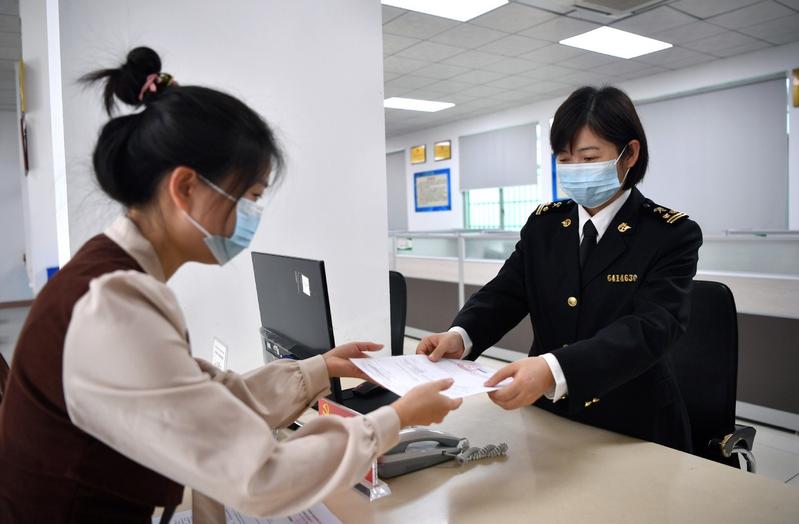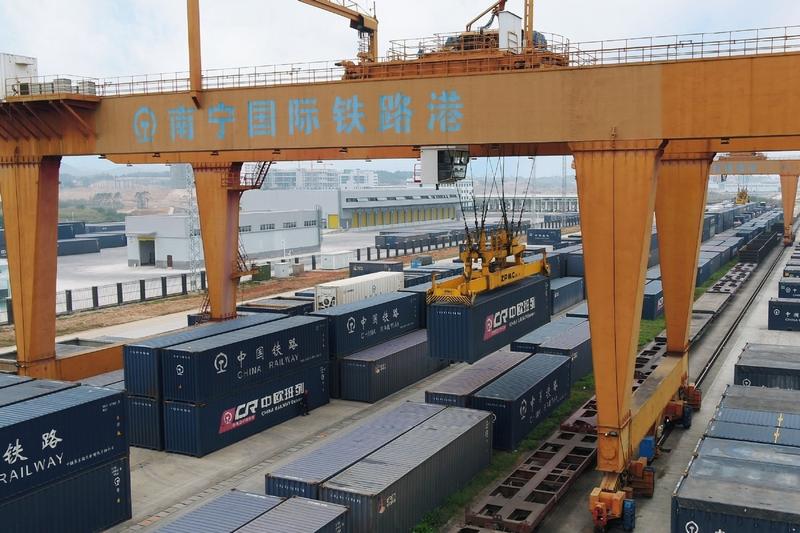 A customs officer (right) in Haikou, Hainan province, issues Hainan's first RCEP certificate of origin on Jan 1, 2022 to Hainan Yanghang Industrial Co. (PHOTO / XINHUA)
A customs officer (right) in Haikou, Hainan province, issues Hainan's first RCEP certificate of origin on Jan 1, 2022 to Hainan Yanghang Industrial Co. (PHOTO / XINHUA)
Chinese authorities will likely unleash more measures to help domestic and foreign enterprises better benefit from the implementation of the Regional Comprehensive Economic Partnership agreement that took effect on Saturday, said experts and business leaders.
They said the moves will add resilience to regional industrial and supply chains and accelerate economic integration to boost free trade and economic globalization.
Accounting for one-third of the world's economy, the RCEP, a free trade agreement signed by 15 Asia-Pacific economies, will eliminate about 90 percent of tariffs on goods traded in the bloc over the next 20 years. Many of the tariffs will be abolished immediately, while some others will be gradually cut to zero over a 10-year period
On Saturday, the China Council for the Promotion of International Trade issued 158 RCEP certificates of origin for 69 enterprises nationwide. Their export goods include mechanical and electrical products, textiles and chemical products. The exports amounted to about $12 million, and the RCEP certificates of origin are expected to help reduce tariffs for the Chinese businesses by $180,000, the council said.
Qu Fusong, director of the storage and logistics department of Dishang Group Co, an apparel company based in Shandong province, said the company is poised to reap rewards from the agreement. Dishang has factories located in the Association of Southeast Asian Nations bloc, which import raw materials from China. The materials will enjoy significant export tariff reduction and elimination, thanks to the RCEP rules of origin, which allow products to have just 40 percent of their value added within the region to enjoy lower or zero tariffs.
ALSO READ: China seen as 'pivotal market' for other RCEP members
Dishang estimates it will save 5 million yuan ($787,083) on tariffs in 2022 on its clothing exports from China to Japan, Qu said.
Accounting for one-third of the world's economy, the RCEP, a free trade agreement signed by 15 Asia-Pacific economies, will eliminate about 90 percent of tariffs on goods traded in the bloc over the next 20 years. Many of the tariffs will be abolished immediately, while some others will be gradually cut to zero over a 10-year period.
 A crane loads containers onto a freight train before its departure from Nanning, Guangxi Zhuang autonomous region, on Dec 31, 2021. (PHOTO / XINHUA)
A crane loads containers onto a freight train before its departure from Nanning, Guangxi Zhuang autonomous region, on Dec 31, 2021. (PHOTO / XINHUA)
The implementation of the RCEP agreement can improve market access and significantly reduce trade and investment costs for enterprises, which will lead to closer economic and trade ties in the region and support global economic recovery.
Zhou Mi, senior researcher at the Chinese Academy of International Trade and Economic Cooperation
"The implementation of the RCEP agreement can improve market access and significantly reduce trade and investment costs for enterprises, which will lead to closer economic and trade ties in the region and support global economic recovery," said Zhou Mi, a senior researcher at the Chinese Academy of International Trade and Economic Cooperation.
The agreement came into force in China, Japan, Thailand and seven other countries on Saturday. The pact will be implemented in South Korea on Feb 1, followed by the remaining RCEP signatories that are completing verification procedures.
Feng Guan, vice-director of the OIG Institute, a research facility of China's leading services platform for frozen product imports, Optima Integration Group, said China is set to increase the volume of imports from the RCEP region. Import items will be expanded and more attention paid to product quality.
"China is very keen to fulfill openness commitments, and both Chinese and foreign enterprises are supposed to seize the opportunities to benefit from the RCEP with supportive measures from the authorities," Feng said.
Yu Benlin, director-general of the Ministry of Commerce's Department of International Trade and Economic Affairs, told a recent news conference in Beijing that China will take concrete measures to support enterprises making use of the RCEP rules.
READ MORE: RCEP: World's largest trade deal enters into force
Commerce authorities will provide RCEP-related information, and consultation and other services to enterprises. Training will be provided to enterprises, especially small and medium-sized ones and those based in the central and western regions of the country, he said.
A guideline for high-quality implementation of the RCEP is also in the pipeline to help businesses make better use of the rules, according to the ministry.
Zhu Wenqian contributed to this story.


